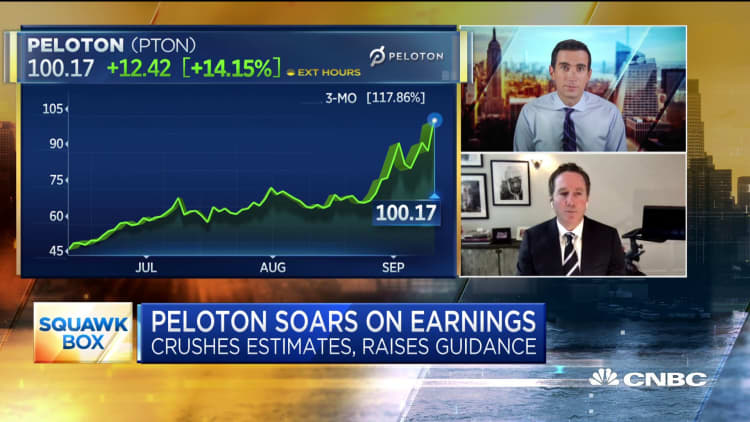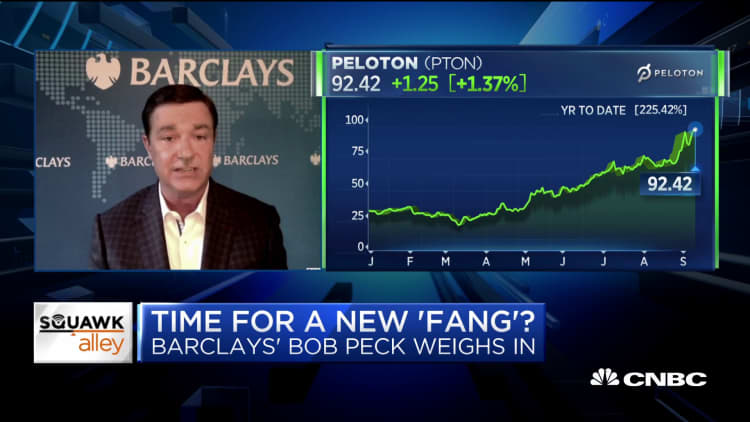
Peloton said Thursday its fiscal fourth-quarter sales surged 172%, as its high-tech stationary bike and treadmill became two of the hottest commodities for people looking to work out at home during the coronavirus pandemic.
The fitness equipment maker also offered Wall Street an eye-popping outlook for the current quarter and fiscal 2021, with sales of its bikes not expected to slow down anytime soon.
But that also means more strain on its supply chain. In a letter to shareholders, Peloton said it had expected demand to "moderate," but a recent resurgence of Covid-19 cases has "perpetuated the imbalance of supply and demand." It said it doesn't expect to return to "normalized order-to-delivery windows" in the U.S. before the end of the fiscal second quarter.
Its shares were up nearly 8% in after-hours trading.
Peloton also has proven that once it hooks a new customer, they tend to stick around. Average net monthly connected fitness churn was 0.75% in the latest period. And it's predicting fiscal 2021 churn will remain under 1%.
Here's how Peloton did for its fourth quarter ended June 30 compared with what analysts were expecting, based on Refinitiv data:
- Earnings per share: 27 cents vs. 10 cents expected
- Revenue: $607.1 million vs. $582.5 million expected
It swung to a profit of $89.1 million, or 27 cents per share, compared with a loss of $47.4 million, or $2.07 per share, a year earlier. Its earnings per share came in 17 cents ahead of analysts' expectations.
Its sales skyrocketed to $607.1 million from $223.3 million a year earlier, topping a forecast for $582.5 million. Part of that increase stemmed from a spike in its apparel business, it said, at a time when many clothing companies are struggling but workout apparel is flying off shelves.
Peloton said it ended the quarter with more than 1.09 million connected fitness subscribers, up 113% from a year earlier, and roughly 3.1 million members in total, including those who only pay for its digital subscription. Connected fitness subscribers are people who pay $39 per month to sync workout classes to their Peloton equipment, versus accessing the programs separately through a phone or tablet device and paying just $12.99.
Its gross margins grew to 47.6%.
The pandemic ultimately boosted revenue more than 24% above the projection Peloton provided for fiscal 2020 after its IPO, while connected fitness subscribers were 23% higher than it originally anticipated in November.
Looking ahead, Peloton said its fiscal first-quarter sales should fall within a range of $720 million to $730 million, which would represent 218% growth year over year from the midpoint — way ahead of expectations for $506 million, according to Refinitiv estimates.
Peloton is calling for fiscal 2021 sales of between $3.5 billion and $3.65 billion, which at the midpoint of that range would be up 96% from a year earlier — again solidly outpacing estimates of $2.7 billion.
Earlier this week, Peloton announced the launch of two new items: A lower-priced, high-tech treadmill and a more expensive bike option with a rotating screen. Analysts expect that should bode well for the business moving forward, by attracting additional members and prompting current customers to make upgrades.
Peloton's new Bike+, which retails for $2,495, is already available for sale. The less-expensive Tread, which will retail for $2,495, is coming to the U.K. on Dec. 26, the U.S. and Canada in early 2021, and Germany later next year, the company said. The original Peloton bike's price has dropped to $1,895 from $2,245, coinciding with the launch of the more expensive version. Peloton's pricier and original treadmill, the Tread+, retails for $4,295.
The company was hoping to launch its new treadmill sooner. However, as demand for its bikes surged during the crisis, it said it had to shift manufacturing resources toward making more bikes, and instead pushed back the launch of both the new bike and the new treadmill simultaneously.
"It has long been our goal to democratize access to fitness and lowering the price of our bike, along with the introduction of our lower-priced Peloton Tread, are important steps in achieving this goal," CEO John Foley said Thursday during an earnings call.
Peloton's users are working out more, too. It said its connected fitness subscribers are averaging 24.7 workouts per month, up from 12 a year earlier. This is due in part to the company launching more non-cycling workouts, like yoga and stretching, on its app. The rotating screen on the new Bike+ is meant to allow users for a more seamless transition between a Peloton bike workout and a floor workout.
Foley said the company is going to need to invest in its supply chain "for years and years" to keep up with demand, especially as it expands into additional markets overseas.
One thing it didn't need to spend as much money on during the quarter was advertising, citing "robust organic demand due to ... strong brand awareness." It said it continued to pause the majority of its media spending through the end of the period.
Peloton ended the quarter with $1.8 billion in cash, cash equivalents and marketable securities on its balance sheet.
As of Thursday's market close, Peloton shares have risen more than 211% this year. Its market cap is about $25 billion.
Find the full press release and shareholder letter from Peloton here.
Watch Peloton CEO John Foley in an exclusive interview on CNBC's "Squawk Box" at 7:45 a.m. ET Friday to discuss the latest results.



